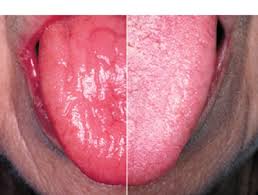 Defined by the subjective perception of a dry mouth as opposed to the presence of any objective parameter.
Defined by the subjective perception of a dry mouth as opposed to the presence of any objective parameter.
Saliva is decreased in volume and becomes more viscous and rope like.
Saliva composed of 99% water, glycoproteins and ions, helps preserve, protect, and repair of oral tissues.
Saliva helps in digestion and taste, tooth remineralization, and immune, and non immune defense mechanisms.
May be associated with many medications, smoking, methamphetamine abuse, and systemic diseases.
The use of more than three medications a day is associated with dry mouth.
Graft versus host disease, and Sjogren syndrome are associated with xerostomia.
Medication effect on salivary flow depends on the drug, dosage, drug interactions, and length of treatment.
Drugs with strong evidence of an association with dry mouth, include: anticholinergic agents, antihypertensives, diuretics, anti-histamines, antipsychotics, medications with sedating properties, anti-depressants, urological medications, and checkpoint inhibitors.
Global prevalence of dry mouth symptoms is about 23%.
Older age is associated with a higher prevalence.
Patients with a dry mouth, have an increased risk of dental caries, dysgeusia, and functional deficits, such as speaking and swallowing.
Patients with dry mouth, have a higher risk of developing oral candidiasis than those without dry mouth.
Secondary to Sjogren’s syndrome an autoimmune mediated acinar degeneration of salivary glands.
Results from iatrogenic salivary gland destruction caused by radiation to treat head and neck cancer.
Salivary glands are sensitive to external radiation when in treatment fields.
Degree of damage depends on the volume and dose of salivary gland tissue radiated.
Normal unstimulated salivary flow is 0.3-.5 mL/min and normal stimulated flow is 1-2 mL/min.
Unstimulated flow is measured by having patients who have not eaten or taken fluids to expectorate accumulated secretions into a container for a specific period of time.
Stimulated collection of saliva relates to the accumulation of expectorated secretions following the chewing of paraffin or sugar free gum.
There is an underestimation of the presence of xerostomia by clinicians compared to patient reports, suggesting that the measurement of salivary flow is a better means of assessing xerostomia.
Correlates with quality of life measures.
Adversely affects chewing and manipulation of food.
Symptoms of dry mouth and salivar gland. hypofunction include: swallowing and speaking difficulties, feeling of oral dryness, thirst, and halitosis.
Associated with difficulty in swallowing and mastication causing alterations diet and nutritional impairments.
Dry mouth has a number of consequences, including altered taste, increased risk of fungal infection, increased risk of caries, and increased prevalence of traumatic ulceration due to lack of lubrication.
Can be associated with abrasion of the mucosa by coarse foods.
Patients avoid bread and grain in an attempt to avoid dry and crumbly foods.
Associated with vocal dysfunction and poor speech performance.
Disrupts the normal homeostasis of the mouth and leads to oral and dental problems.
Saliva contains antimicrobial lactoperoxidase and IgE antibodies, and when deficient lead to dental decay.
Changes taste and increases dental caries.
Drinking sucrose rich drinks or sucking on hard candy to relieve dry mouth can increase dental decay.
Oral discomfort frequently associated with sleep impairment.
Associated with periodontitis and increased episodes of candidiasis.
Treatment alleviate symptoms are improving, salivary secretion.
Strategies for management to include increased hydration of approximately 2 L of water daily, use of humidifiers, mechanical, salivary/gustatory stimulants-sugar-free candy or chewing gum, medications, and saliva substitutes.
Topical electrolyte sprays or oxygenated glycerol triester sprays.
Topical therapies for dry mouth are less effective and shorter acting than systemic sialagogues, such as pilocarrpine and cevimeline which are muscarinic receptors agonists.
Pharmacologic salivary stimulants include Pilocarpine and cevimeline (Evoxac).
Drinking water throughout the day is helpful.
Some patients benefit from ice chips or saliva substitutes.
